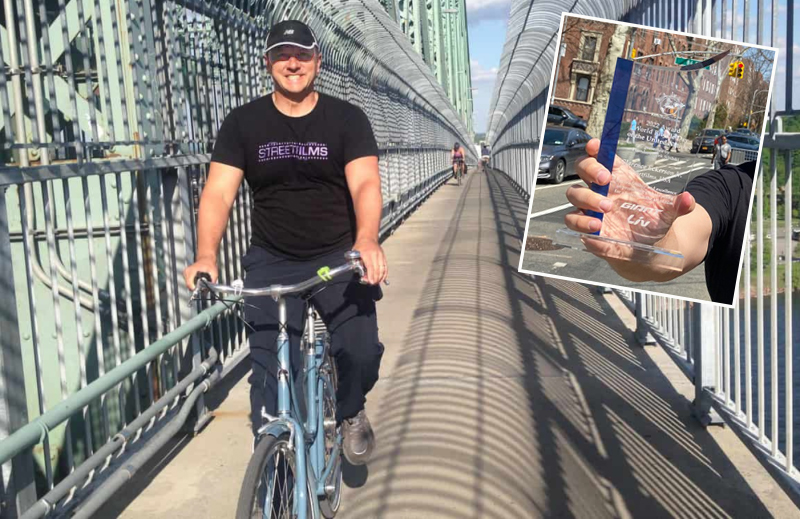Editor's note: This article first appeared at PassBlue and is republished with permission.
There are not many things that United Nations members can all agree on, but who can contest the glories of the humble bike? With its narrow frame, tiny carbon footprint and ample contributions to health and well-being, the bike has few enemies. Which helps explain how, against all odds, a Polish-American cycling enthusiast named Leszek Sibilski, with no official ties to the U.N., was able to help line up all 193 U.N. countries to support a 2018 resolution declaring June 3 World Bicycle Day.
Getting a resolution adopted is “very challenging,” he remarked in a phone interview, sounding still-surprised four years later. “You have to be very patient, very determined, and you will hear many no’s.”
Turkmenistan — also surprisingly — led the way. “I went to the most obvious ones and they were not interested,” Sibilski, a sociologist and former consultant to the World Bank, says.
Slightly more than half the world’s population knows how to cycle, Sibilski notes, which leaves “a huge challenge facing us” before this clean, nimble mode of travel can achieve world domination. Till then, “resolutions are the most valuable document in terms of activism and making a difference.”
The bicycle day resolution passed by the General Assembly does more than simply mark off another date on a calendar already crowded with such noteworthy celebrations as National Potato Chip Day, National Weed Day (the front-lawn variety) and — everyone’s favorite — National Dance Like a Chicken Day. The declaration behind World Bicycle Day not only promotes safe biking but also encourages U.N. members “to devote particular attention to the bicycle in cross-cutting strategies ... and to include the bicycle and bicycle network infrastructure that connects communities in international, regional, national and subnational development policies and programs.”
That goal is borderline political, so helmets off to the global bike lobby, including the World Cycling Alliance, the European Cyclists Federation and the winners of Sibilski’s annual cycling advocacy awards, which he administers in conjunction with World Bicycle Day.
Nodding to “the very competitive nature of the cycling community” — he is a former member of the Polish Olympic team — Sibilski says: “I decided to try to reverse this and recognize people who are contributing day in and day out to bicycling all over the world. This year’s 30 awardees are from all inhabited continents, and 50 percent are women or organizations involving women.”
They will receive their individually inscribed, blue acrylic desktop plaques by mail, given Covid.
To the delight of New York City activists, awardees include the local-cyclist-made-good Clarence Eckerson Jr., who has done as much as anyone to promote safe streets near UN headquarters, in East Midtown Manhattan. In hundreds of streetwise, bike-centric videos for Streetfilms, a long-running project of the nonprofit group Open Plans, Eckerson captures the glories — and road blocks — experienced by cyclists. Some of his most-viewed videos reveal streams of cyclists pouring through formerly car-clogged cities like Bogota, while others expose the harsh realities of poorly developed city centers in less-enlightened nations.
Like New York City, for example, where Eckerson filmed advocates chomping at their helmet straps along congested Second Avenue during a U.N.-focused bike tour on May 22.
“People like Clarence are enlightening us, they are showing us something tangible, and that’s his power,” Sibilski says. “Through his work he can point out what is working and what is not working. He’s passionate and knowledgeable and recognized by everyone in cycling community.”
Eckerson’s videos can be useful when citizen advocates go begging for bike lanes, safe streets, maybe just a little respect. “I’m my own agent and idea maker,” he says. “Before Covid, I flew to Barcelona because they have a grid of streets without through-traffic.”
Without through-traffic: fighting words in a car-centric culture. In New York City, where cars rule, decades of hard work have yielded new bike lanes, some of course much safer than others, and sporadic car-free zones, including patches along Broadway and on 34th Avenue, in Jackson Heights, not far from where Eckerson and his family live (and his 6-year-old son is learning how to pedal).
Sibilski sees parallels between integrating cycling into city planning and integrating universal access. “You have to change the mentality of politicians and urban planners,” he says.
Eckerson, 55, grew up in Goshen, N.Y., and didn’t have a bike until he was in sixth grade. A year later, he acquired a newspaper route — “seven days a week, for five years,” he says. “It prepared me for life.”
He was still a kid when someone handed him an 8-millimeter camera. The result has been a career he describes as “one-third advocate, one-third journalist and one-third filmmaker.”
A big turning point came in 1992, after he moved to New York City. “It was spring,” he recalls, “and I had the rush of riding my bike home down Broadway — a traffic-scary corridor.
“It was so liberating.”
Sibilski can relate. “It’s unbelievable what bicycle rides can do for you,” he says. “You bike for one hour and you come home happy.”
Deborah Baldwin is a veteran editor and writer, most recently for This Old House; previously, she was an editor for The New York Times, working on the Style section and other parts of the newspaper.






